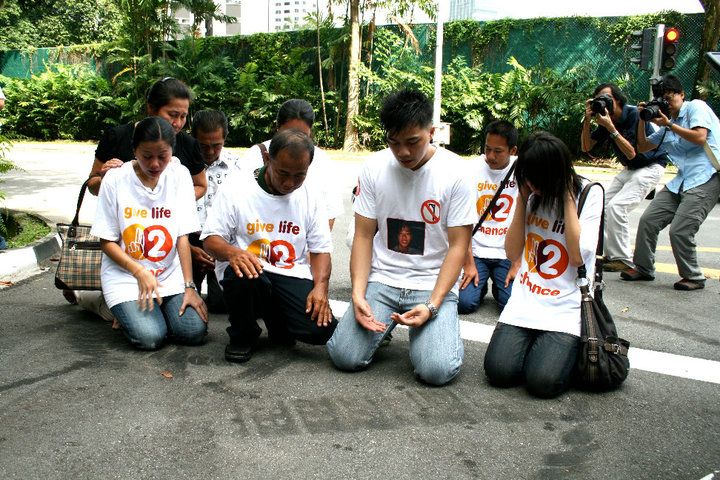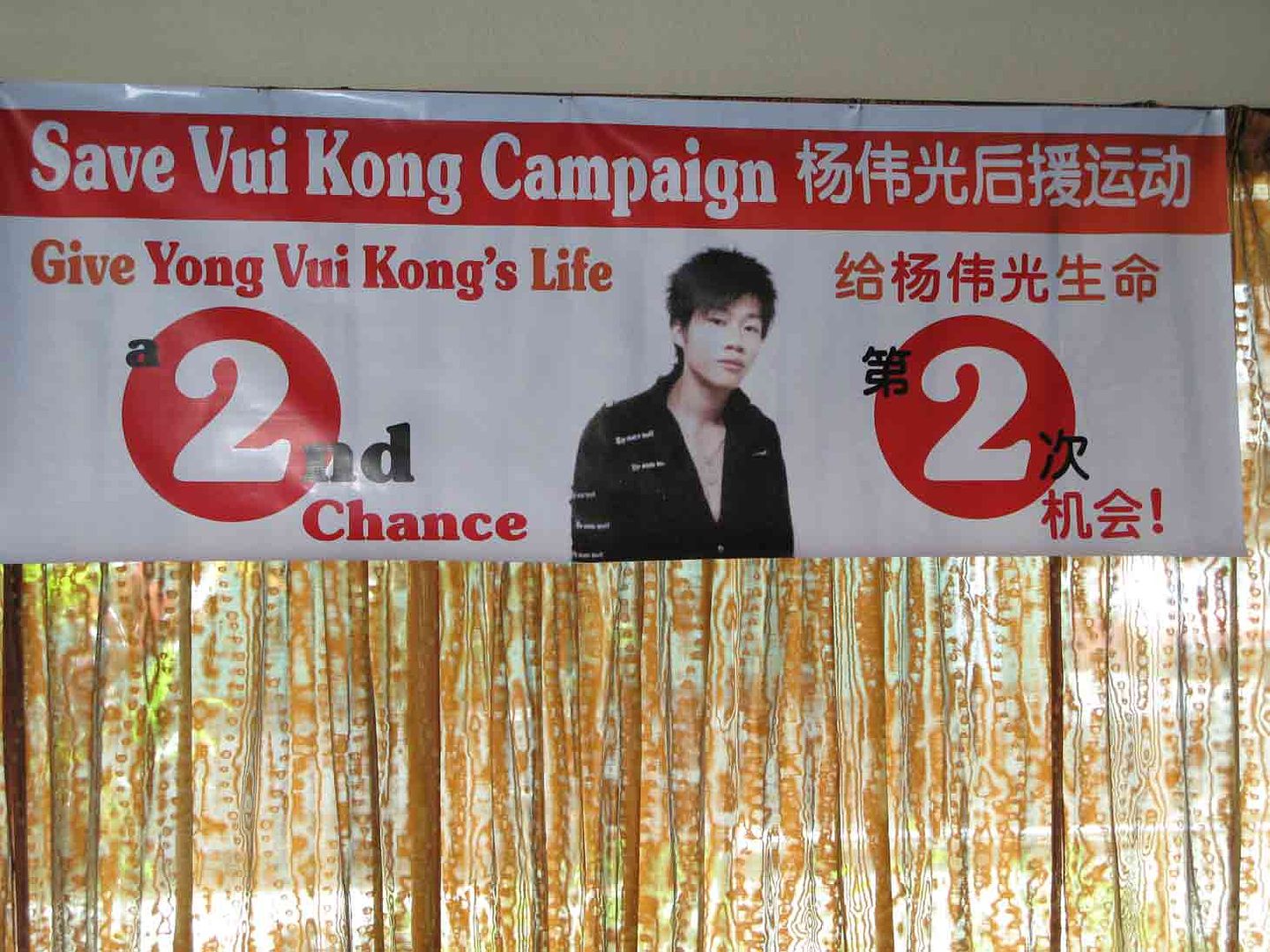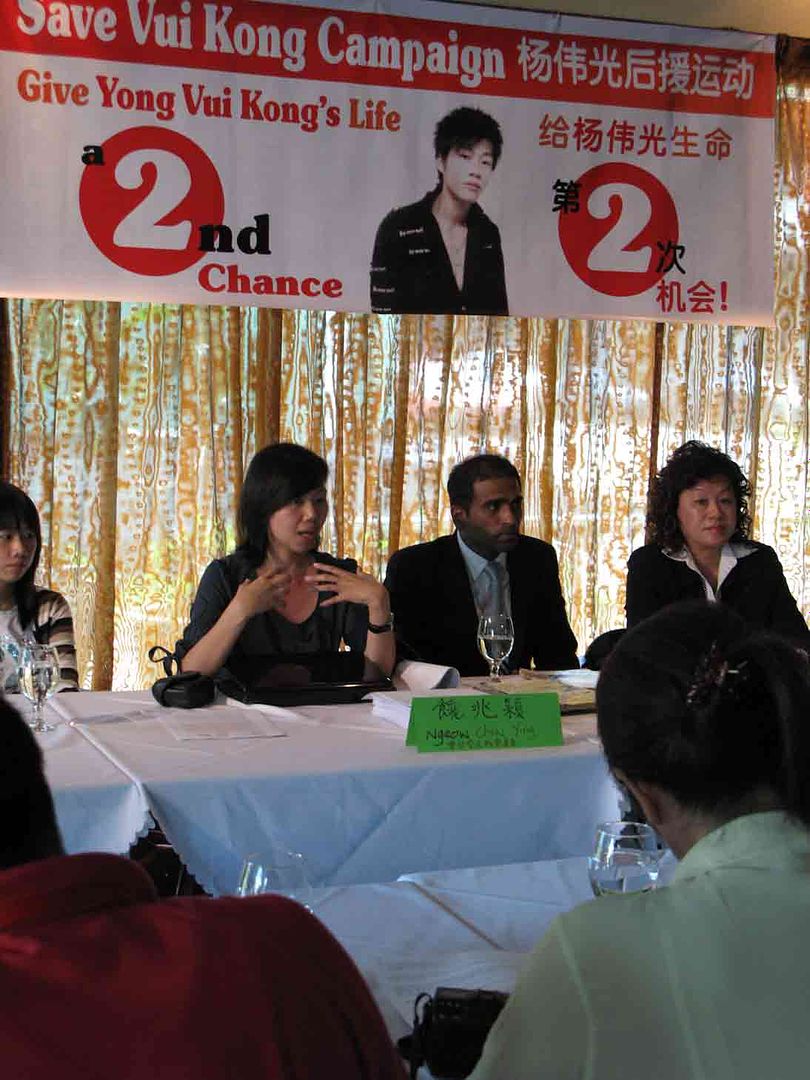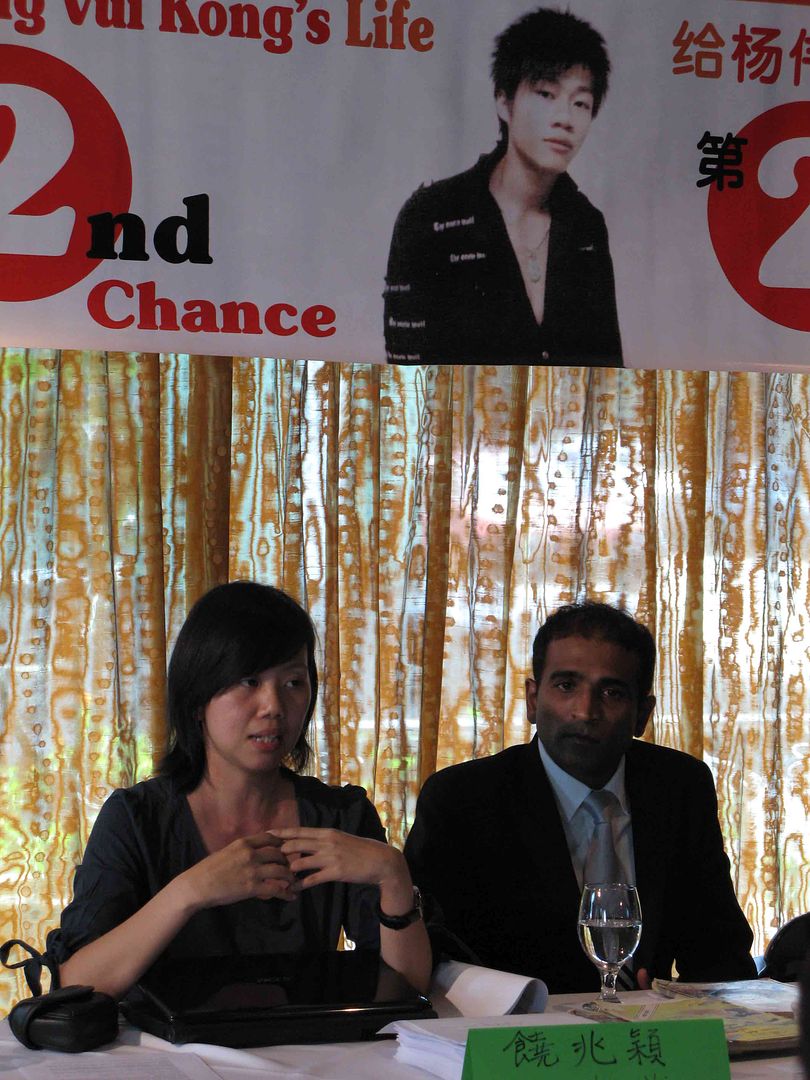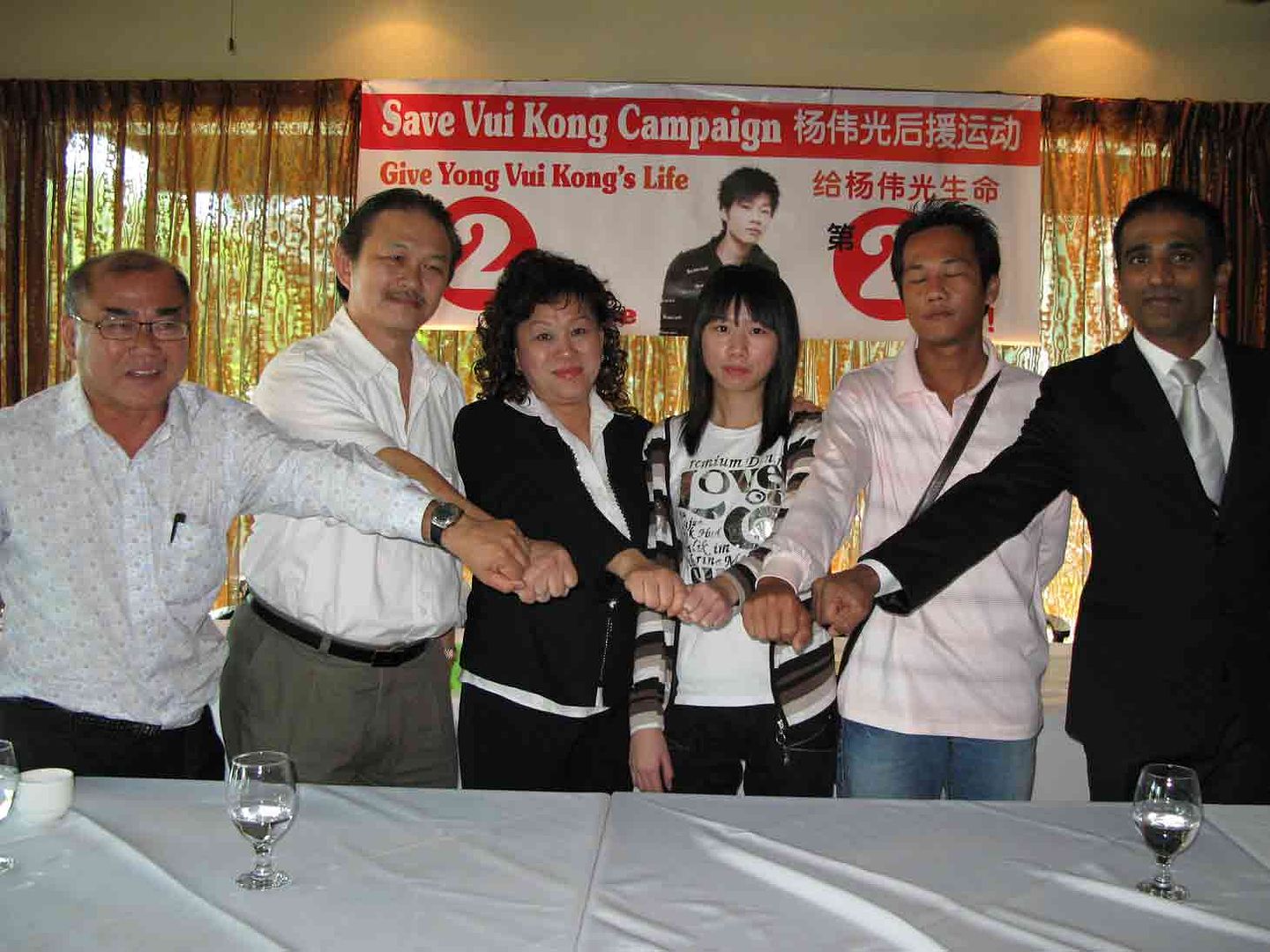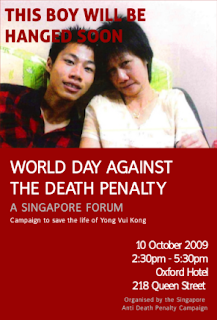Yong Vui Kong's Journey
An account of Yong Vui Kong's life
Vui Fung, Vui Kong, Ah Lun, Yun Leong with their mother
Yong Vui Kong, born to a family of 6, went through a turbulent childhood when his parents divorced while he was very young. As a result his mother had to raise the kids singlehandedly.
Being a dishwasher she brought home RM$200 a month, and the family had to scrap by at the most basic sustenance level.
Eventually this paved the way for Vui Kong's departure from their hometown of Sabah, East Malaysia to the big city of Kuala Lumpur.
Vui Kong with brothers during happier days
In 2002, Vui Kong the country boy left Sabah for KL, bringing nothing but him and the desire to make it big.
A young and rebellious Vui Kong
He was described by his family as "rebellious", often mixing with bad company and getting into trouble. Yet, Vui Kong would be the apple in his mother's eyes. He treated his siblings well, especially Vui Fung who would often relate how much Vui Kong doted on her, even though he would sometimes throw his temper at home when things were not going well for him.
Vui Fung (Fung Fung) with Vui Kong
But all these was not meant to last.
Vui Kong worked as a kitchen hand in KL, but was later introduced to a gang, whose boss showered him with 5 star hotel stays and treated him to meals he could never be able to afford.
Vui Kong mixed with the wrong company, which eventually sealed his fate
Eventually Vui Kong went from debt collecting to "delivering gifts". These gifts turned out to be drugs. At that young and impressionable age, Vui Kong had no idea that the penalty for trafficking of drug was mandatory death.
The "gifts" that Vui Kong delivered to Singapore
At 18, Yong Vui Kong was conscripted for National Service. He would later return to KL back to the same boss who provided him with work and lead him on to be a drug runner.
Vui Kong would later shuttle back and forth Singapore and Malaysia several times until he was caught in June 2007 with possession of 47g of heroin. Yong was 18 and a half years old at the time of arrest. Singapore drug laws stipulate mandatory death for 18 years and above. Vui Kong faced certain death the moment he was caught by narcotics officers.
Vui Kong, represented by state-assigned counsel Kelvin Lim, was trialed in Singapore High Court.
Justice Choo Han Teck found Vui Kong too young to be dealt with the mandatory death sentence
Before passing the judgement, trial judge Justice Choo Han Teck summoned both the defence and presecution into chamber and asked the prosecution if they would consider reducing the charge given the relatively young age of the drug offender, who was not even 19 at the age of the offence. The prosecution declined and the death sentence was handed to Vui Kong.
Yong's then defence counsel, following the common practice for almost all capital cases for drug trafficking, was preparing to take the case to the Court of Appeal.
Kelvin Lim, under specific instruction from his client, withdrew the Appeal.
Changi Prison customary photo taking session before execution
At this point in time, Vui Kong's sister, Fung Fung, had already bought a shirt and pants for her brother. It is customary for prisoners on death row to don on their best in a bizzare and morbid prison practice - photos of the prisoner in various poses will be shot and the pictures will be sent to the convict's family after the execution.
"I don't want to lie to save myself."
Vui Kong instructed his lawyer to withdraw the appeal
Why did Vui Kong withdraw the appeal?
Apparently, he was under the impression that a High Court Appeal could only work if there are new evidence to prove that he was innocent of the charge, and he thought that the only way out was to lie to be able to save himself.
After taking up Buddhism as his religion while in prison, Vui Kong did not want to lie which was a sin according to Buddhist beliefs, he therefore instructed his counsel to withdraw the Appeal.
Vui Kong did not know that he involuntarily extended his stay in this world by withdrawing his own High Court Appeal, the only legal lifeline available to him.
Because of this withdrawal, the high Court hastened the execution process and ordered Yong to be executed on 4th December 2009.
M. Ravi intervenes
M. Ravi holding a picture of a Buddha like figure drawn by Yong while in prison
Singapore human rights lawyer Madasamy Ravi got wind of Yong's case. He promptly took over the case from Yong's counsel Kelvin Lim after a court hearing.
Ravi submitted a clemency appeal to the Singapore President, but on 20th November, it was rejected by the Istana.
Yong was granted a rare last minute stay of execution
Two days before Yong's scheduled execution, Ravi made an application for a stay of execution for Vui Kong pending a High Court hearing for an appeal. The Court of Appeal had previously not heard Vui Kong's case as his defence lawyer had withdrawn it.
Vui Kong broke down in court when he heard his execution on Friday was stayed
The judge decided that he was not in the position to make the decision for the Court of Appeal, granted the stay of execution for Vui Kong. Vui Kong, who was present in court, broke down and cried when he heard the news.
Vui Kong Finally meet his mother after two years of incarceration
A day after the court's decision, Yong met his mother, who came to Singapore accompanied by his siblings. Upon seeing his mother, Yong knelt and bowed to her three times in a show of respect.
Vui Kong's mother still does not know that her son had been sentenced to death.
For fear that she may commit suicide due to suffering from chronic depression, Vui Kong's family had kept his fate away from her. The only idea she has of why her son is in jail is that "he had committed a very serious matter and that he will be gone for a very long time in order to atone for his sins and will not return unless he has attained self fulfillment".
On 8th December, Vui Kong received a 2nd stay of execution, this time from the Court of Appeal. The stay of execution was in effect until the Appeal was presented and debated in court. The court gave the defence much needed time to prepare the case, and activists more time to campaign for it.
Yong outlived his original death sentence for a full 4 months. This was something he never saw coming on the eve of his execution.
Campaigns to save Vui Kong
Singapore Anti Death Penalty Campaign flyer
Ravi, in the months after the court's decision to grant the stay of execution, set off to do his research, pro bono. He engaged the help of Queen's counsels in London, dug up the various developments in other Commonwealth countries on the mandatory death penalty and at the end compiled an appeal submission 5 volumes thick.
London team of lawyers who provided valuable research and help: Parvais Jabbar, Edward Fitzgerald QC, M. Ravi and Saul Lehrfreund
On 15th March the high Court convened for Vui Kong's appeal. After both sides presented their cases and arguments, the judges praised M. Ravi for the effort he had put into his submission and thanked him for providing the court with an update on current international practices with regards to the death penalty. They decided to reserve judgement on the hearing until further notice. (credits to
TOC)
"The court acknowledge that the mandatory death sentence is considered a cruel, degrading and inhuman punishment," - Chief Justice Chan Sek Keong
On 14th May, the Court of Appeal duly rejected the appeal. But it acknowledged that the mandatory death sentence is considered a cruel, degrading and inhuman punishment.
In June, Vui Kong's counsel M. Ravi made a trip down to KL in an attempt to rally the Malaysians together over the case.
There was a buzz initially when the Malaysian online media carried Vui Kong's story, but it fizzled out after a week or two.
Umi Azlim, the Malaysian girl sentenced to death for drug trafficking
In 2007, Umi Azlim was sentenced to death in China. Curiously, she had a sentence commuted to life imprisonment after the Malaysian government appeal to the Chinese government citing compassionate grounds.
Vui Kong received no such attention from the Malaysian government.
"Probably because he presents no political mileage. He is first of all a (Malaysian) Chinese, and a Sabahan."
But the Malaysian media had their ways. many online media outlets, especially MalaysiaKini, ran a media blitz over Vui Kong's case and nudge the Malaysian government to do something to help the boy who was facing the gallows overseas.
Ravi with MP Tian Chua and Malaysia's Foreign Minister Anifah Aman (Photo: TOC)
But all was not lost. On 3rd July it was announced that PKR's MP Tian Chua would table a debate on Vui Kong's case in Parliament the following Monday. It was rejected by the Speaker of Parliament, but a press conference was held and Malaysia's Foreign Minister was present.
"After all, I am a Sabahan too” - Malaysia's FM Anifah Aman pledged to assist in Yong's case
He told Ravi and the Malaysian press, “All things aside, if I save one life it will give me great satisfaction. After all, I am a Sabahan too”, referring to the Malaysian state where Yong comes from. (Credit: TOC)
After his statement, almost all media outlets in Malaysia carried the news.
Malaysian activists promptly got to work to set up a site, 2ndChance4Yong, to campaign for Vui Kong. For the first time, Yong did not just have to rely on Singapore, he had the support of the people from his country as well.
The campaign for Vui Kong, Give Life 2nd Chance, was launched and the petition gathered over 3000 signatures in a few days. The campaign also rallied Malaysian Parliamentarians together to show support for a President clemency to spare Yong's life based on compassionate ground.
Ngeow Chow Ying, Syed Husin and Tunku Abdul Aziz
Malaysians brought it a step further. On 21 July, Malaysian lawyer and campaign coordinator Ngeow Chow Ying, together with Dewan Negara senators, came together for a press conference to plea for clemency for Vui Kong and rally Malaysians' support.
She said, "We understand Singapore, like Malaysia, has a strict policy against drug trafficking which carries a mandatory death penalty. However, given that the constitution allows clemency plea for persons sentenced to death means that no sentence of capital punishment is by default excluded from reconsideration for a second chance."
Soon after, Malaysian Foreign Minister Anifah Aman wrote to Singapore President S.R. Nathan, requesting clemency on compassionate grounds. The President did not reply to the letter.
Give Vui Kong a Second Chance
Increasingly, Singaporeans were getting aware that judicial hangings for drug trafficking were done in the name of the people. On Aug 2, more than 150 people turned up at Speakers’ Corner to support the petition for clemency for Yong Vui Kong.
The family had to walk to the back of the Istana to submit the clemency petition
The Save Vui Kong campaign saw more than 109 346 signatures collected over the span of more than a month. These signatures together with a formal clemency petition, were submitted to the President at the Istana on 24 Aug 2010.
The family, together with Sabah Member of Parliament Datuk Chua Soon Bui, faced curt security officers who merely took the piles of signatures and repeatedly told them to leave. Deflated, disappointed and anxious, the family walked back in tears.
Protest outside S'pore High Commission
Yong’s original deadline for filing his Petition for Clemency to the President was 26 August. It was feared that he would be hanged soon after that deadline. In the face of imminent execution of Vui Kong, Malaysian lawyers and parliamentarians rallied together and protested outside the Singapore High Commission in Kuala Lumpur on 26 August.
One of the lawyers and Malaysian Member of Parliament, S. Manickavasagam said if Yong Vui Kong is hung, they will come in a big group and bring a coffin box to be placed in front of the High Commission.
Another stay of execution for Vui Kong, left
The Singapore Prisons Department in a letter dated 25 Aug 2010 replied Yong's lawyer M. Ravi that he would be granted an extension to file his clemency appeal to the President. The confirmation of extension comes as a relief to Mr Ravi who had repeatedly asked the SPS for the confirmation since 18 August.
What was Vui Kong doing all these while?
Vui Kong, remorseful but hopeful to live and contribute to society
Meanwhile, Vui Kong had been brushing up on his English. In his possession is a Chinese-English dictionary and some Buddhist texts. He tries his best to learn English, a new language to him, for the purpose of communicating with his lawyer.
Periodically he pen letters to his family and friends, sharing religious teachings, gratitude and encouragement. He wakes up early every morning to meditate.
When the court granted him a stay of execution last December, one of the first people to pay Vui Kong a visit was his lawyer, M. Ravi. During the meeting, Vui Kong presented him a gift – a picture that had taken him weeks to complete. He would kneel for hours as he drew. The
picture is a colourful interpretation of one of the manifestations of Lord Buddha, standing at the gates of hell, saving souls from eternal damnation.
“He is remorseful and feels he should be severely punished,” his brother Yun Leong explained, “but he wants to live so he can continue seeing us, seeing our mother again. He wants to keep learning and meditating and being a better person.”
To be continued...
Updated 27th Aug 2010






